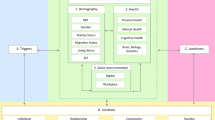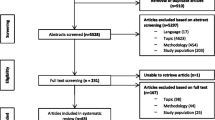Abstract
Recent Findings
Although rates of intellectual disabilities (ID) may be elevated in homeless populations, there is little research on homeless adults with ID whose cognitive and adaptive functioning deficits may affect how they respond to usual supports.
Purpose of Review
This literature synthesis describes the prevalence of ID among homeless adults, the needs of adults experiencing homelessness who have ID, and discusses implications for providing Housing First to people with ID. Housing First is an evidence-based intervention commonly delivered to homeless populations.
Summary
People with ID are vastly overrepresented in homeless populations, with prevalence estimates ranging from 12–39% across countries, although none are population-based. Limited evidence also suggests that homeless people with ID may have more enduring needs than other homeless people, suggesting a need for longer term supports. More research will be instrumental in determining if Housing First models are appropriate for this population and if adaptations are necessary to account for their unique needs.
Similar content being viewed by others
References
Papers of particular interest, published recently, have been highlighted as: • Of importance
Lougheed D, Farrell S. The challenge of a “triple diagnosis”: identifying and serving homeless Canadian adults with a dual diagnosis. J of Policy and Practice in Intellect Disabilities. 2013;10:230–5. https://doi.org/10.1111/jppi.12041.
Durbin A, Lunsky Y, Wang R, Nisenbaum R, Hwang S, O’Campo P, Stergiopoulos V. Borderline intellectual functioning and duration of homelessness among adults with mental illness. Health Policy Submitted January 2018.
Housing is the Best Medicine Supportive Housing and the Social Determinants of Health. CSH. The source for housing solutions. July 2014. http://www.csh.org/resources/housing-is-the-best-medicine-supportive-housing-and-the-social-determinants-of-health/. Accessed May 3, 2018.
American Association of Intellectual and Developmental Disabilities: Definition of intellectual disability. http://aaidd.org/intellectual-disability/definition#.WvQxXNPwYu8 (2018). Accessed 13 Apr 2018.
Lunsky Y, Klein-Geltink JE, Yates EA, editors. Atlas on the primary care of adults with developmental disabilities in Ontario. https://www.ices.on.ca/Publications/Atlases-and-Reports/2013/Atlas-on-Developmental-Disabilities. Accessed 12 Apr 2018.
McKenzie K, Milton M, Smith G, Ouellette-Kuntz H. Systematic review of the prevalence and incidence of intellectual disabilities: current trends and issues. Curr Developmental Disorders Reports. 2016;3:104–15. https://doi.org/10.1007/s40474-016-0085-7.
Maulik PK, Mascarenhas MN, Mathers CD, Dua T, Saxena S. Prevalence of intellectual disability: a meta-analysis of population-based studies. Res Dev Disabil. 2011;32:419–36. https://doi.org/10.1016/j.ridd.2010.12.018.
Bremner AJ, Duke PJ, Nelson HE, Pantelis C, Barnes TR. Cognitive function and duration of rooflessness in entrants to a hostel for homeless men. Br J Psychiatry. 1996;169:434–9. https://doi.org/10.1192/bjp.169.4.434.
Oakes PM, Davies RC. Intellectual disability in homeless adults: a prevalence study. J Intellect Disabil. 2008;12:325–34. https://doi.org/10.1177/1744629508100496.
Solliday-McRoy C, Campbell TC, Melchert TP, Young TJ, Cisler RA. Neuropsychological functioning of homeless men. J Nerv Ment Dis. 2004;192:471–8. https://doi.org/10.1097/01.nmd.0000131962.30547.26.
Van Straaten B, Schrijvers CT, Van der Laan J, Boersma SN, Rodenburg G, Wolf JR, et al. Intellectual disability among Dutch homeless people: prevalence and related psychosocial problems. PLoS One. 2014;9:e86112. https://doi.org/10.1371/journal.pone.0086112.
• Van Straaten B, Rodenburg G, Van der Laan J, Boersma SN, Wolf JR, Van de Mheen D. Self-reported care needs of Dutch homeless people with and without a suspected intellectual disability: a 1.5-year follow-up study. Health & Soc Care in the Community. 2017;25:123–36. https://doi.org/10.1111/hsc.12287. This Netherlands-based article shows the prevalence of ID among a homeless sample. It also compares individuals who are homeless with an ID to individuals who are homeless but do not have an ID in terms of met, unmet and no need across broad domains.
Nishio A, Yamamoto M, Ueki H, Watanabe T, Matsuura K, Tamura O, et al. Prevalence of mental illness, intellectual disability, and developmental disability among homeless people in Nagoya, Japan: a case series study. Psychiatry Clin Neurosci. 2015;69:534–42. https://doi.org/10.1111/pcn.12265.
Nishio A, Yamamoto M, Horita R, Sado T, Ueki H, Watanabe T, et al. Prevalence of mental illness, cognitive disability, and their overlap among the homeless in Nagoya, Japan. PLoS One. 2015;10:e0138052. https://doi.org/10.1371/journal.pone.0138052.
Nishio A, Horita R, Sado T, Mizutani S, Watanabe T, Uehara R, et al. Causes of homelessness prevalence: relationship between homelessness and disability. Psychiatry Clin Neurosci. 2017;71:180–8. https://doi.org/10.1111/pcn.12469.
Okuda K. For support and understand the people who is homeless states. Homeless and Society. 2010;13:90–5.
Mathias JL, Bowden SC, Barrett-Woodbridge M. Accuracy of the Wechsler test of adult reading (WTAR) and National Adult Reading Test (NART) when estimating IQ in a healthy Australian sample. Aust Psychol. 2007;42:149–56. https://doi.org/10.1080/00050060600827599.
• Durbin A, Lunsky Y, Wang R, Nisenbaum R, Hwang S, O’Campo P, et al. The effect of Housing First on housing stability for people with low intellectual functioning. Can J Psychiatr. 2018:27. Submitted Feb 5 2018. This article assessed how individuals with borderline or lower intellectual functioning fared in Housing First models. It showed no differences in housing stability for individuals with borderline or lower intellectual compared to people with higher than borderline intellectual functioning. However, more outcomes beyond housing stability should be examined to determine if any group differences emerged. Also, future work should distinguish between people with intellectual disabilities and borderline intellectual functioning.
Mercier C, Picard S. Intellectual disability and homelessness. J Intellect Disabil Res. 2011;55:441–9. https://doi.org/10.1111/j.1365-2788.2010.01366.x.
Fournier L. Enquête auprès de la clientèle des ressources pour personnes itinérantes des régions de Montréal-Centre et de Québec, 1998–1999. In: Collection la santé et le bien-être. Institut de la Statistique du Québec. 2001. http://www.stat.gouv.qc.ca/statistiques/sante/etat-sante/sante-globale/enquete-itinerants-1.pdf. Accessed 10 Mar 2018.
Woodhall-Melnik JR, Dunn JR. A systematic review of outcomes associated with participation in housing first programs. Hous Stud. 2016;31:287–304. https://doi.org/10.1080/02673037.2015.1080816.
Iaquinta MS. A systematic review of transition from homelessness to finding a home. J Community Health Nurs. 2016;33:20–41. https://doi.org/10.1080/07370016.2016.1120593.
Kennedy J, Arku G, Cleave E. The experiences of front-line service providers of housing first programme delivery in three communities in Ontario, Canada. International J of Hous Policy. 2017;17:396–416. https://doi.org/10.1080/14616718.2016.1248528.
Hwang SW, Burns T. Health interventions for people who are homeless. Lancet. 2014;384:1541–7. https://doi.org/10.1016/S0140-6736(14)61133-8.
Tsemberis S, Eisenberg RF. Pathways to housing: supported housing for street-dwelling homeless individuals with psychiatric disabilities. Psychiatr Serv. 2000;51:487–93. https://doi.org/10.1176/appi.ps.51.4.487.
Padgett DK, Stanhope V, Henwood BF, Stefancic A. Substance use outcomes among homeless clients with serious mental illness: comparing Housing First with Treatment First programs. Community Ment Health J. 2011;47:227–32. https://doi.org/10.1007/s10597-009-9283-7.
Stergiopoulos V, Hwang SW, Gozdzik A, Nisenbaum R, Latimer E, Rabouin D, et al. Effect of scattered-site housing using rent supplements and intensive case management on housing stability among homeless adults with mental illness: a randomized trial. JAMA. 2015;313:905–15. https://doi.org/10.1001/jama.2015.1163.
• Ombudsman’s report: nowhere to turn. Investigation launched November 29, 2012. Report released August 24, 2016. https://www.ombudsman.on.ca/Files/sitemedia/Documents/NTT-Final-EN-w-cover.pdf. The Ontario Ombudsman report Called “Nowhere to Turn ,” is based on a four-year investigation into the care and treatment of adults with developmental disabilities. It reported that this population commonly experienced homelessness, incarceration, abuse and neglect. Appropriate housing is one the key issues discussed in this report.
Burge P. Assertive community treatment teams and adults with intellectual disabilities. Journal on Developmental Disabilities. 2009;15:96–102.
Bigby C, Ozanne E, Gordon M. Facilitating transition: elements of successful case management practice for parents of older adults with Intellectual disability. J Gerontol Soc Work. 2002;37:25–43. https://doi.org/10.1300/J083v37n03_04.
Hassiotis A, Ukoumunne OC, Byford S, Tyrer P, Harvey K, Piachaud J, et al. Intellectual functioning and outcome of patients with severe psychotic illness randomised to intensive case management Report from the UK700 trial. Br J Psychiatry. 2001;178:166–71.
Martin G, Costello H, Leese M, Slade M, Bouras N, Higgins S, et al. An exploratory study of assertive community treatment for people with intellectual disability and psychiatric disorders: conceptual, clinical and service issues. J Intellect Disabil Res. 2005;49:516–24. https://doi.org/10.1111/j.1365-2788.2005.00709.x.
Oliver PC, Piachaud J, Tyrer P, Regan A, Dack M, Alexander R, et al. Randomized controlled trial of assertive community treatment in intellectual disability: the TACTILD study. J Intellect Disabil Res. 2005;49:507–15. https://doi.org/10.1111/j.1365-2788.2005.00706.x.
Burra TA, Stergiopoulos V, Rourke SB. A systematic review of cognitive deficits in homeless adults: Implications for service delivery. Can J Psychiatr. 2009;54(2):123–33.
Roy S, Nuamah O, Hewitt T, Budin R, & Svoboda, T. Intellectual Disabilities in the Toronto Shelter System: Triage, Screening and Developmental Services Ontario (DSO) Eligibility..
Somers JM, Moniruzzaman A, Patterson M, Currie L, Rezansoff SN, Palepu A, et al. A randomized trial examining Housing First in congregate and scattered site formats. PLoS One. 2017;12:e0168745. https://doi.org/10.1371/journal.pone.0168745.
Collins SE, Malone D, Clifasefi SL. Housing retention in single-site Housing First for chronically homeless individuals with severe alcohol problems. Am J Public Health. 2013;103:S269–74. https://doi.org/10.2105/AJPH.2013.301312.
McGillicuddy NB. A review of substance use research among those with mental retardation. Developmental Disabilities Research. 2006;12:41–7. https://doi.org/10.1002/mrdd.20092.
McLaughlin DF, Taggart L, Quinn B, Milligan V. The experiences of professionals who care for people with intellectual disability who have substance related problems. J Substance Use. 2007;12:133–43. https://doi.org/10.1080/14659890701237041.
van Duijvenbode N, VanDerNagel JE, Didden R, Engels RC, Buitelaar JK, Kiewik M, et al. Substance use disorders in individuals with mild to borderline intellectual disability: current status and future directions. Res Dev Disabil. 2015;38:319–28. https://doi.org/10.1016/j.ridd.2014.12.029.
Lin E, Balogh R, McGarry C, Selick A, Dobranowski K, Wilton AS, et al. Substance-related and addictive disorders among adults with intellectual and developmental disabilities (IDD): an Ontario population cohort study. BMJ Open. 2016;6:e011638. https://doi.org/10.1136/bmjopen-2016-011638.
Lunsky Y, Durbin A, Brown HK, Bansal S, Heifetz M, Antonio T. Health profiles and associated service use among adults with HIV and intellectual and developmental disabilities. AIDS. 2017;31:697–705. https://doi.org/10.1097/QAD.0000000000001361.
Durbin A, Brown HK, Bansal S, Antoniou T, Jung JKH, Lunsky Y. How HIV affects health and service use for adults with intellectual and developmental disabilities. J Intellect Disabil Res. 2017;61:682–96. https://doi.org/10.1111/jir.12381.
Sullivan B, Diepstra H, Heng J, Bradley E, Casson I, Hennen B, et al. Primary care of adults with intellectual and developmental disabilities. Can Fam Physician. 2018;64:254–79.
Lennox NG, Diggens J, Ugoni A. Health care for people with an intellectual disability: general practitioners’ attitudes, and provision of care. J Intellect Develop Disabil. 2009;25:127–33. https://doi.org/10.1080/13269780050033544.
Lennox NG, Diggens JN, Ugoni AM. The general practice care of people with intellectual disability: barriers and solutions. J Intellect Disabil Res. 2007;41:380–90. https://doi.org/10.1111/j.1365-2788.1997.tb00725.x.
Martin G. Support for people with learning disabilities: the role of primary care. Prim Care Community Psychiatry. 2005;10:133–42.
Ouellette-Kuntz H. Understanding health disparities and inequities faced by individuals with intellectual disabilities. J Appl Res Intellect Disabil. 2005;18:113–21. https://doi.org/10.1111/j.1468-3148.2005.00240.x.
Scheepers M, Kerr M, O’Hara D, Bainbridge D, Cooper S, Davis R, et al. Reducing health disparity in people with intellectual disabilities: a report from Health Issues Special Interest Research Group of the International Association for the Scientific Study of Intellectual Disabilities. J Policy Pract Intell Disabil. 2005;2:249–55. https://doi.org/10.1111/j.1741-1130.2005.00037.x.
Brady N, Halm L. Speech, language, and communication assessments and interventions. In: Wehmeyer ML, Brown I, Percy M, Shogren KA, Fung WLA, editors. Comprehensive guide to intellectual and developmental disabilities. Brooks: Baltimore; 2017. p. 447–60.
Brown I & Percy M. (Editors.). Developmental disabilities in Ontario (3rd Edition) Ontario Association on Developmental Disabilities. Toronto. Front Page Publishing. 2011.
Condillac R. Behavioral intervention. In: Wehmeyer ML, Brown I, Percy M, Shogren KA, Fung WLA, editors. Comprehensive guide to intellectual and developmental disabilities. Baltimore: Brooks; 2017. p. 401–12.
Acknowledgements
The authors would like to thank Tomislav Svoboda, Frances McNeil, Radek Budin, and Terri Hewitt for their part in discussions that were reflected in this work.
Author information
Authors and Affiliations
Corresponding author
Ethics declarations
Conflict of Interest
The authors declare that they have no competing interests.
Human and Animal Rights and Informed Consent
This article does not contain any studies with human or animal subjects performed by any of the authors.
Additional information
This article is part of the Topical Collection on Intellectual Disability
Rights and permissions
About this article
Cite this article
Durbin, A., Isaacs, B., Mauer-Vakil, D. et al. Intellectual Disability and Homelessness: a Synthesis of the Literature and Discussion of How Supportive Housing Can Support Wellness for People with Intellectual Disability. Curr Dev Disord Rep 5, 125–131 (2018). https://doi.org/10.1007/s40474-018-0141-6
Published:
Issue Date:
DOI: https://doi.org/10.1007/s40474-018-0141-6




